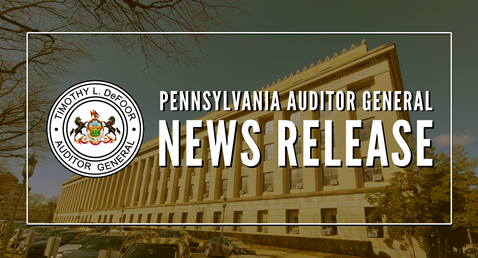Auditor General DePasquale Says Erie Rise Leadership Academy Charter School in Disarray
Issues his first-ever interim audit finding to identify immediate changes needed
Auditor General DePasquale Says Erie Rise Leadership Academy Charter School in Disarray
Issues his first-ever interim audit finding to identify immediate changes needed
HARRISBURG (March 31, 2014) – In an extremely rare action for his department, Auditor General Eugene DePasquale today released an interim audit finding of the Erie Rise Leadership Academy Charter School that indicates serious problems with school board oversight, the school’s academic performance, and its compliance with state laws and the school’s charter.
Interim audit findings are only issued by the Department of Auditor General when during the course of a review auditors identify issues that require immediate attention. A final report will be issued at the conclusion of the audit.
“It is alarming that the school’s board of trustees has essentially given the chief executive officer and a financial management company full rein over all aspects of the school without any real oversight,” DePasquale said. “The charter school board should consider this interim finding as a wakeup call — get your act together and do it now. ”
Auditors found that the board has failed to monitor the financial consultant, which has access to the school’s bank accounts, controls payment of invoices, manages staff hiring and payroll, bills school districts for tuition, handles vendor contracts, and amends the school’s budget.
The interim finding notes that neither the financial consultant nor the school’s CEO provided the charter school board with financial and operational information necessary to properly govern the school. This missing information includes treasurer reports, bills, expenditure approvals, check registers, and complete annual financial reports.
DePasquale also said that the charter school’s fundamental documentation is incomplete, unsigned, and/or missing completely, including payroll and teacher certification records, background clearances, vendor contracts, student data and statements of financial interest for employees and board members.
“The extent of the financial consulting company’s control increases the risk that the board and the CEO might not know if the company acted inappropriately,” DePasquale said. “There is no evidence that the CEO monitors the financial consulting company’s activities adequately, nor has evidence been supplied to suggest that the board has control over the charter school’s key operations, as required by the charter school law.”
Among the issues identified in the interim review:
- the charter school’s academic performance is failing, as demonstrated by its low School Performance Profile score of 58.4 out of a possible 100 for the 2012-13 school year, and its low scores of 29.17 percent in math and 28.42 percent in reading on the 2012-13 Pennsylvania System of School Assessment;
- several employees violated state regulations by collecting salaries from the charter school while simultaneously receiving retirement payments, including the CEO who for more than a year collected a $120,000 salary from the charter school while receiving retirement benefits;
- during the 2013-14 school year, the kindergarten girls’ classroom student to teacher ratio was 32:1, exceeding the 20:1 student to teacher ratio in the approved school charter;
- the charter school board failed to establish discipline rules, including a student code of conduct and never required a mandatory attendance plan as required by the approved charter;
- the charter school’s management did not monitor attendance and did not follow up with the parents of absent students as outlined in its approved charter;
- without approval from the authorizing school district, the charter school educated its sixth grade class in the same building as its K-5 classes, even though its charter states that the sixth grade would be in a separate building; and
- the charter school combined second and third grade boys’ classes in 2011-12 and third and fourth grade boys’ classes in 2012-13 school year in violation of the school’s charter.
“It is our hope that the board of the Erie Rise Leadership Academy Charter School uses this interim audit finding as a blueprint for correcting the charter school’s serious deficiencies,” DePasquale said. “The charter school board owes it to their students and to the taxpayers to do whatever is necessary to immediately regain control and oversight of this school.”
DePasquale recommended that the charter school board :
- accept responsibility for overall governance of the charter school;
- develop a clear plan for addressing the charter school’s poor academic performance, including measureable benchmarks for success that can be monitored by the board and the CEO;
- prepare and maintain documentation required to demonstrate compliance with the charter and all applicable laws and regulations including, payroll records, background clearances, certification records, vendor contracts, statements of financial Interest, student information data, and tuition billings;
- establish a system of accountability for all functions contracted out to vendors and a method for ensuring that the charter school clearly documents the board’s approval of all contracts;
- ensure compliance with Pennsylvania School Employee Retirement System requirements;
- prepare accurate and complete board meeting minutes;
- receive monthly bank reconciliations, treasurer reports, bills, expenditure approvals, check registers, and complete annual financial reports;
- either amend its charter to reflect its current operations or bring its operations back into compliance with the charter, including classroom organization, teacher student ratios, attendance monitoring and board composition; and
- establish benchmarks for measuring management’s performance and hold management accountable when these standards are not met.
The department’s Bureau of School Audits examines the records of school districts, charter schools, intermediate units, and area vocational-technical schools. The audits — among other things — assess whether or not school entities received the state subsidies and reimbursements to which they were entitled, accurately managed taxpayer funds, and complied with ethics codes. The audits also determine whether or not teachers and administrators were properly certified for the positions they held during the audit period.
# # #
Return to search results